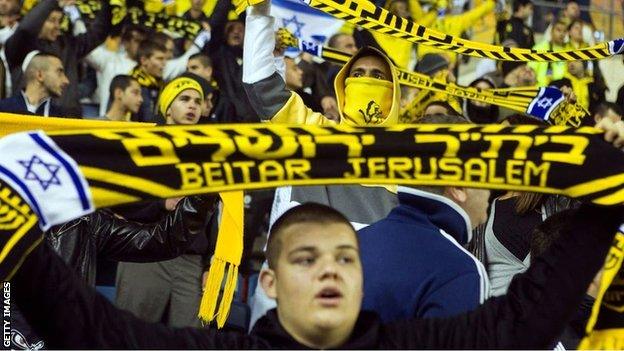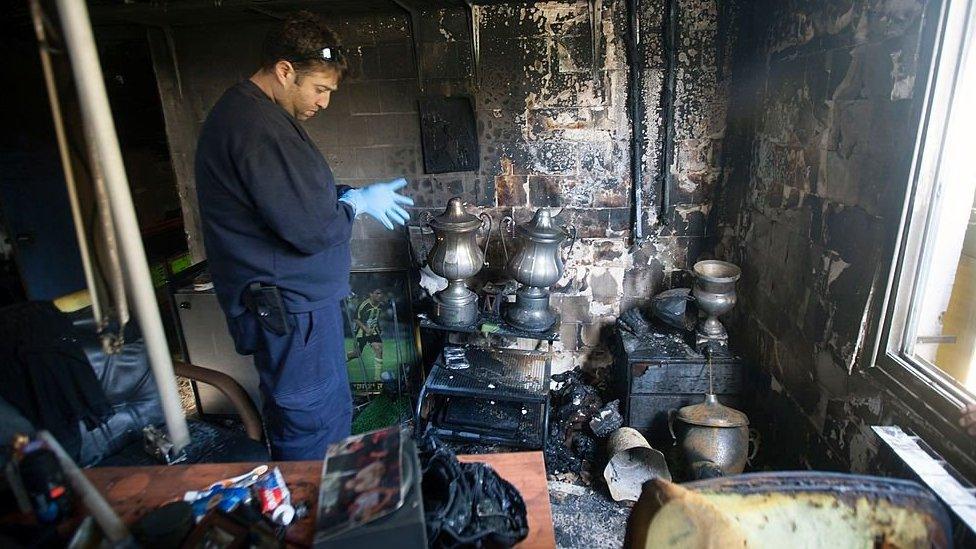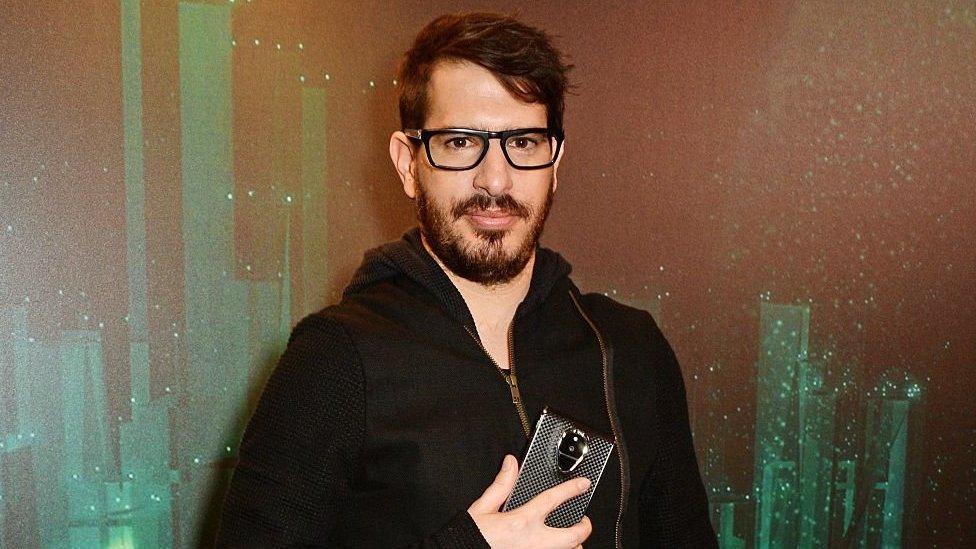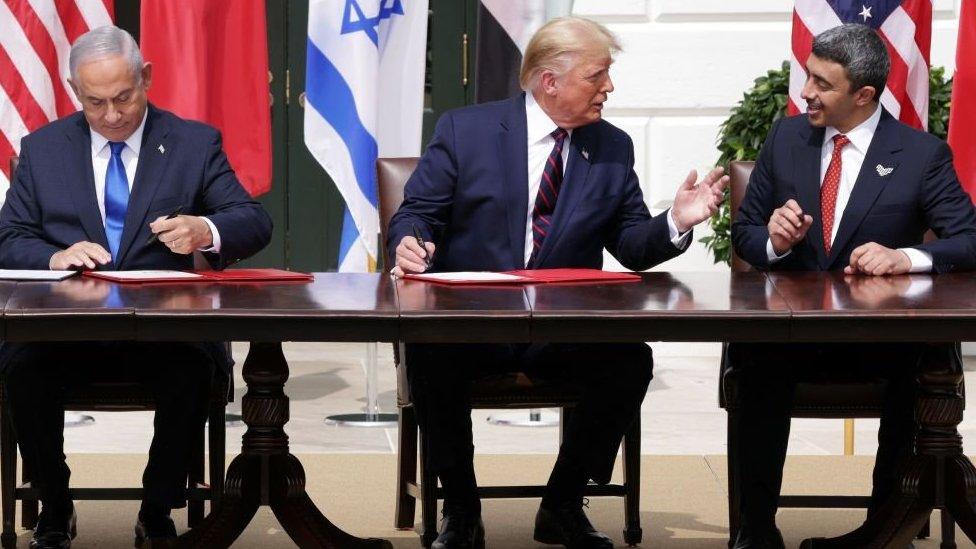Beitar Jerusalem: Why is an Arab investor pouring money into Israel's 'most racist football club?'
- Published

Beitar Jerusalem supporters have the reputation of displaying an anti-Arab and anti-Muslim bias
When a group of around 100 fans stopped a Beitar Jerusalem training session by invading the pitch on 4 December, the reason for their discontent wasn't the fact that the football club lies very near the relegation zone of the Israeli league.
They stormed the ground to protest against negotiations for an investment in the club by a member of the United Arab Emirates (UAE) ruling family.
The club announced on 7 December it had signed an investment agreement with Sheik Hamad bin Khalifa Al Nahyan.
Beitar supporters are known for their anti-Arab, anti-Muslim bias and violent behaviour.
As well as the pitch invasion, fans sprayed offensive graffiti on the walls of Beitar's stadium in the days leading up to the announcement.
The deal has not been well-received by some Arab commentators either.
Sports radio host Saied Hasnen told the New York Times that the deal was "shameful". He particularly criticised the investment in a club with supporters who have an anti-Arab stance.
In exchange for a 50% stake in Beitar, who currently lie 11th in the 14-team Israeli league, Al Nahyan has committed to invest around $92 million in the club for the next 10 years.
The acquisition is one of the many commercial deals that have taken place since the UAE and Israel moved to establish diplomatic relations last September.
A bad reputation
While it is not the most substantial agreement signed between the two countries, the Beitar deal is certainly among the most controversial.
Jewish and Arab players regularly feature in Israel together, including the national team. But the Jerusalem club has never signed an Arab player, although it does have them in its youth teams.
In 2013, supporters allegedly torched Beitar's offices following the signing of two Muslim footballers from Chechnya.

Beitar's offices were torched in a 2013 arson attack linked to the signing of two Chechen Muslim players
During matches, racist chants like "Death to Arabs" and offensive banners are common, despite the efforts from the current club owner to change such behaviour.
New owner, old challenges
Moshe Hogeg, an IT millionaire, took over Beitar in 2018. He was born in Israel and has a Tunisian father, while his mother has Moroccan origins.
In an interview with the BBC in December 2019, he described efforts to curb racist behaviour that included the threat of costly legal action against fans whose behaviour was viewed as discriminatory.
"I'm not trying to ruin anyone's life. I'm not trying to be their father and their mother. I'm not trying to educate them - it's not my job," Hogeg said.
"But when you bring it to the stadium and you act in that way it reflects badly on all of the crowd and on our nation, so I can't take this."
Hogeg also said he would never sign an Arab player "simply to make a point", but that he wouldn't be afraid of taking that step for sporting reasons.
"I don't care about a player's religion and I don't care about his colour. I care if he can help the team, if he's a good footballer," he stated.

IT millionaire Moshe Hogeg bought into the club in 2018 and promised to change a toxic culture
"Whether it's going to happen or not, there's a lot of good Arab Israeli players and it could be that we will make an offer for one of them."
In a statement issued after the announcement of the deal with Al Nahyan, Hogeg adopted a conciliatory tone.
"Together, we all march the club to new days of coexistence, achievement and brotherhood for the sake of our club and community," he said.
Business and friendship
Al Nahyan had told the Jerusalem Post newspaper that his desire to invest in Beitar was sparked by several years of friendship and a business relationship with Hogeg.
In a statement following the announcement of the deal, the Emirati Al Nahyan spoke of his "excitement" to be a partner at the club.
"I have heard a lot about the change taking place in the club and the way things are going. I am happy to take part in that," he said on Monday.

Israel and the UAE signed a peace agreement mediated by the US in September
Journalist Anshel Pfeffer, who is the author of a biography of Israel's hard-line PM Benjamin Netanyahu, explains that Beitar's supporters have links with governing party Likud.
Netanyahu has even been photographed at their matches.
"There is nothing ironic about Al Nahyan owning half of Beitar Jerusalem. His family has made a strategic decision to invest in their ties with Israel's leadership," Pfeffer told the BBC.
In fact, Al Nahyan's carefully worded statement on 7 December included an allusion to Jerusalem as the capital of Israel.
The city's status is one of the core issues in the Israeli-Palestinian conflict.
Israel considers all of Jerusalem its capital, a position that the United States supports but that is not recognised by most countries.
Palestinians seek to make East Jerusalem, which Israel captured in the 1967 Middle East war, the capital of their future state.
Following its agreement to establish relations with Israel, the UAE announced that it was committed to establishing a Palestinian state with East Jerusalem as its capital.